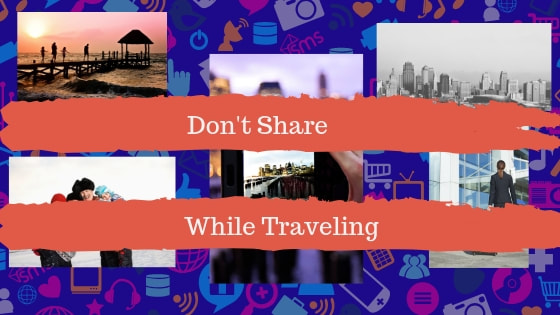|
There is usually a lot of excitement about going on vacation, or even on a business trip, and if the trip goes well, there are new experiences to be discussed. And up to the advent of cell phones you usually had to wait till you got home to tell friends and family about the experience. And to show them your photographs.
Of course, now you can share each moment of a trip in real time with friends and family, and sometimes, thieves and scammers. The problem is that we are creatures of habit. We have become to depend on our smartphones for just about everything - from communicating to banking. And we have become accustomed to the gratification of an nearly instant response when we post something. It is just like having your friends there. Now, however, that can include people you don't really know. "Keep it secret" is the best advice, and here are some ways to do so: 1. If you are traveling don't announce it on social media, or a blog, and if you need travel advice, ask it privately. And if you can't contain yourself in your excitement please don't put dates and travel details. 2. It is actually advised to have a separate phone specifically for travel, which only has minimal personal data on it. If you cannot do this make sure that your security settings on your banking, and social sites are updated. 3. Try to avoid using public Wi-fi. If you need to a public hotspot look for secured public Wi-Fi that requires a password. This Tales Off Road article offers a excellent overview of pocket Wi-Fi devices, which would help you avoid using public Wi-Fi. 4. Turn off anything to do with location-identification so that it doesn't appear in your posts, and set your Facebook for Timeline Review in case you are tagged in a travel photo. 5. Do not share flight information. This type of information can be used for anything from virtual kidnappings to social engineering that targets businesses. 6. If it is a family trip make sure to talk to your children about online safety, and make sure the security settings on their phones are updated. 7. Don't post or "check-in" while on the vacation. 8. Save the Sharing till you get home! No matter how excited you are save all of those photos and comments till you arrive home. If that seems overwhelming use a social media scheduler for Twitter. Facebook no longer allows third-party apps to post to personal pages. And I am guessing a few are saying, "But I have my privacy and security settings locked down. Only friends can see it." That goes back to the question of "how well do you know all of your social media friends?" While hopefully this is a very rare case you can read here of a family whose home was burglarized by some of their daughter's Facebook friends. When traveling pretend like it's the "old days," and save your photographs and fond memories till you come home. Resources: Security Intelligence's "Five Tips to Stay Safe on Social Media While Traveling" Nationwide's "7 Social Media Vacation Safety Tips" Traveling with Stories' "Social Media Travel Safety Tips."
1 Comment
In the course of several conversations with business associates, and friends, I have been reminded of one of the often unrecognized differences in social media usage. There are two different cultures when it comes to business pages and personal pages. But many people are unaware of these cultures. While we were discussing her unused facebook business page an acquaintance said, "Well, we won't be pursuing social media. I have known too many friends and family who get really upset when trying to decide to "unfriend" someone. It just takes up time."
And amongst friends, particularly when I have commented on part of a post on my personal page, I am asked, "Haven't you been following the discussion?" Usually the answer is, "no." Not because I don't care about what is happening with my friends, but because my main social media time is for my business. Now I will grant that the line can blur in social media, particularly if business associates are following your personal page. And friends are following your business. Yet, there are still differences in the cultures. And I compare it to the difference between a business lunch, and a cookout. The first difference obviously are the topics. At a business lunch the discussion is more focused. At a leisurely cookout the topics could flow all over the board. Behavior is another. Professionalism normally holds sway over a business luncheon with the associates behaving with a certain level of decorum. At a cookout you might kick back, and relax. Or show your true feelings. Transparency is one of the keywords of social media. So business people do need to be more aware of what they put on their personal pages, and to whom the post goes to when you write something. There are ways to post to only close friends, and to avoid seeing postings from "friends" that annoy you, even if you don't want to "unfriend" them. With business pages you are focusing on the story, and brand, you want to present to the public, and that is with the full understanding that what is posted is public. If personally a business owner doesn't want to be involved with social media there are ways to make personal pages fairly private. So there is no reason to consider social media just an exercise in a high school mindset of "they don't like me anymore." You can go to the business lunch, but if you want, you can turn down the invitation to the cookout. I'm going to say up front that I love when a business hires me to handle their social media marketing; not only because of the business itself, but the chance to design a program that works for my client. However, before any business takes a step towards social media as a marketing tool, whether on their own, or letting someone else handle it, there are new developments they need to take into consideration.
Not that long ago a Facebook business page offered a great opportunity for free marketing, and everyone had heard the stories of the pages that became phenomena in their own right. And the common cry was, "You have to have a Facebook page!" And that was what many businesses did, particularly the smaller ones. Some of those pages are now sad, empty virtual store fronts, but other businesses have dutifully posted to their pages. Maybe not every day, maybe not every week, but they posted. Unfortunately that faithfulness isn't offering the rewards it once did, and in truth hasn't in a while. What has been happening is that Facebook has truly become a corporation, and has been decreasing its "organic reach" (how your free posts appear in newsfeeds). And they are doing so again. Rumor has it that the changes is so that businesses will buy Facebook advertising, or buy "likes" to boost a specific post, and there is a strong likelihood that rumor is true. It has always been true that if you aren't active on Facebook (at least 3 times a week) that your posts would get bumped from newsfeeds by more active pages. This also requires having "sharing" and "liking" occurring. Now this is even more so. The truth be told, you can't just concentrate on Facebook. All of the social media platforms are intertwined. So to have it worth your while you need steady activity on Twitter, Google +, and Linkedin (at minimum). We won't even get into the power of original content (blogs) or YouTube. This is where you need to decide whether you can commit to social media. Small businesses always have had challenges when it comes to marketing. They try very hard to stick to flyers and business cards they can do themselves. Maybe get a free website up. And try to do a bit with Facebook. However there comes a time when you have to go to a printer, or get professionally done business cards, and its the same with social media. You have to ask yourself whether you have the money, or the time, to make it work for you? Whether you work in an office, or your business is out in the elements, your business has seasons. And most people can track those in their minds, even if they never put the information to paper. You know when the peak times are, and when the slow times stretch. You also know why. And for those with seasonal businesses you know that there are fluctuations within the seasons, which will affect you. A wet spring? A steamy summer? Those fluctuations require different reactions.
All of this is the mother lode of content! And at the beginning of the year is the perfect time to sit down, and do an outline of your season. While you are doing this, ask yourself some questions. 1. Can you give a head's up to your clients about what is coming up? Can you put out a call for action? 2. What suggestions can you give to them? What tips? 3. What causes your slack times? What types of promotional can you use to head them off? Or at least ease them. 4. If your work is seasonal, what can you suggest for preparation for the coming season? 5. What should your clients know about weather related delays? Of course, there are also those who are just starting out, and don't know your "seasons" yet? Then you take a hard look at your products, or services. And ask yourself, what stories can you tell about those products or services? Start off by telling about yourself. Your personnel. Why you were passionate enough to have started a business. Spend time detailing aspects of your products, and services. Information - not just sales pitches. And tell about your passions in the community. What are your favored charities? Where do you pitch in? Established or new - tab into your seasons! When you are thinking about doing social media what should you have ready?
1. Look around your business, and think about questions your customers have asked. Are there reoccurring ones? Are there special products that normally need a little more explaining. What is your history with the business? And general trends that you are aware of in your profession? 2. Then think of your seasons. What is your down time? What is your busy season? What produces these highs and lows? 3. What pictures, photos, or graphics do you associate with your business? Always keep in mind that images are a powerful tool on social media sites. 4. What organizations, hobbies, or charities are you involved in? What industry magazines do you subscribe to? 5. And never forget to keep track of special events that might be coming up, or are reoccurring. All of these provide the "meat" for your ongoing social media campaign. It doesn't matter whether you, a staff member, or a consultant is handling the day to day - all of this will be needed. The knowledge of the highs and lows, and the special events, will help to create a calendar for your campaign. Just keep in mind, it really is no different than the thought processes that every business owner uses in the life of their business. You know it better than you know your home, and you can discuss it at length. And all of that is what it takes to make a good social media campaign. I am starting to think that one of the scariest thing for many business owners is that social media demands ongoing activity. The fact that business is coming into an era of "digital word of mouth" is intimidating.
Recently I was speaking with a prospective customer, and was working with a new approach. I had decided to develop this approach because I thought the term "social media" was what was terrifying people. So I set off to explain that instead of worrying about the technical end of social media that they should first think of it as doing what they always did - interacting with their customers. To look at it as an extension of the local word of mouth. As we were discussing traditional advertising, and what made this different, I pointed out that standard advertising was one way. You develop your flyers, your newspaper ads, T. V. spots, and radio strategies, and all of these are sent out into the great world. And basically, unless someone mentions any of the business's advertisements, you will never really know what brought the customer in. With social media you have a better chance of interacting with your customers, and giving them a chance to know you. They know they can contact you quickly from any number of mobile tools, and express themselves in "real time." And as I was listening to my potential client I realized that it may not be a fear of the term "social media," but stage fright. That the need to come up with interesting material on a weekly basis caused him to freeze. It didn't matter that I can help with finding content - it was that owner input would be required. Nor was it just a terror of needing original content it was that there had to be a consistent strategy. This also got me thinking of some of my other clients. When I am setting up for a new client I will talk to them about the aspects of their business that could be used for blogging, or helpful hints. And I will also ask about organizations, hobbies, and charities they are involved in. The later gives me filler material to work with when I don't have original content. The first response I often get is, "Oh, I'll leave that to you!" I always do a follow up email after the initial fright goes away. In the email I will ask the same questions, and usually get better input. Really it is a case of realizing that while social media is more interactive that basic marketing still applies. The business owner knows their products, and when they create the standard advertising they know they will need images and focused content. With social media you need all of that, but you also need to have an idea what you want to do week to week. You need to know consistently, "what is the meat of the story?" |
Cathy Mosley
Cathy Mosley brings her 26 years of storytelling and writing experience to the realm of Social Media. To help small businesses. Archives
July 2021
Categories
All
|






 RSS Feed
RSS Feed

